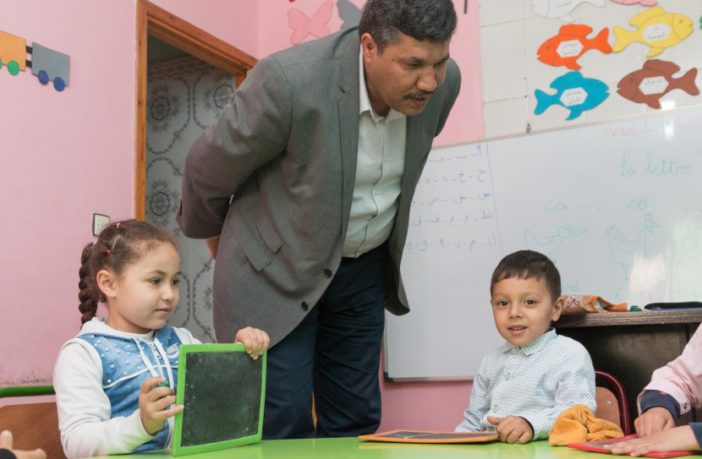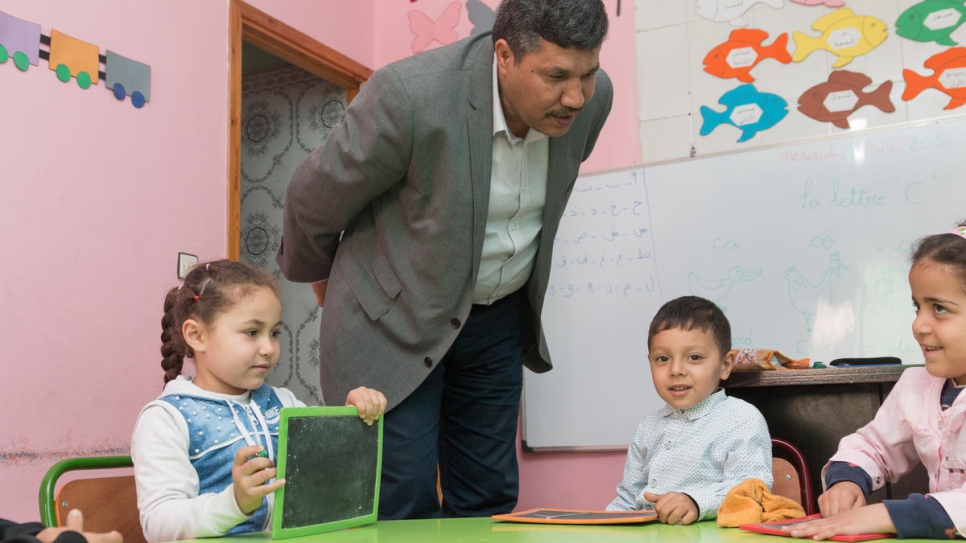UNHCR.org
By Malgorzata Bratkrajc
in Kenitra, Morocco
After Morocco allowed refugees to start cooperatives, a group of Yemeni friends opened a kindergarten for refugee and local children.
A brightly painted three-storey building in Kenitra, 40 kilometres north of Morocco’s capital Rabat, stands out among its pastel-hued neighbours.
It is home to the country’s first refugee cooperative, a kindergarten called “Hope”, run by a group of refugees from Yemen’s three-year war.
Inside, Moroccan and Yemeni children play in rooms decorated with cartoon characters and leaf-shaped signs showing the months of the year in Arabic and French. At pick-up time, refugee and local families chat with the kindergarten’s Yemeni and Moroccan staff.
“My parents chose to enrol my little sister in this nursery school since the Yemeni cooperative teaches pupils classical Arabic from an early age,” said a 16-year-old Moroccan girl, there to collect her sister. “In Moroccan kindergartens, they tend to speak Darija, our local dialect.”
Morocco is home to about 7,000 refugees and asylum-seekers from more than 50 countries. More than 3,000 are Syrians, the largest group, followed by about 530 Yemenis who have sought refuge from the world’s largest humanitarian crisis.
The kingdom remains a country of transit for many, but in recent years it has become a destination for refugees from sub-Saharan Africa and the Middle East.
Recognizing this trend, the government, under the instructions of King Mohammed VI, adopted a new immigration and asylum policy in September 2013. This offered new protections for refugees in Morocco, providing access to public education, health services and the job market.
“I thought ‘why not start a project that would help all of us meet our needs for an occupation?’”
In 2016, the country introduced further changes allowing refugees to establish their own cooperatives which, according to a local partner of UNHCR, the UN Refugee Agency, benefits refugees seeking sustainable livelihoods.
“Cooperatives are beneficial for refugees,” said Oualid Chourak, programme manager at the Moroccan Association for Supporting the Promotion of Small Enterprises (Amappe). “The new law provides for tax exemption, which is a competitive advantage over other types of businesses. It also allows access to micro-credit schemes.”
The head of the Hope kindergarten cooperative is 45-year-old Abdullah, originally from Amran, northwest of the Yemeni capital, Sana’a. He came to Morocco in early 2016 to study for a doctorate in economics and subsequently registered as a refugee when it became clear he would be unable to return safely to his homeland in the near future.
Realizing he needed a means of supporting himself, Abdullah approached some of his Yemeni friends in Kenitra with the idea of establishing a cooperative that would make use of their academic backgrounds.
“I thought ‘why not start a project that would help all of us meet our needs for an occupation, and linked with our speciality in education?’,” he said. After fulfilling the administrative requirements with the help of Amappe in April 2017, the Hope kindergarten opened its doors.
A total of 25 Moroccan and Yemeni children attend the kindergarten and, besides the eight Yemeni partners, it employs seven local staff as teachers, nursery assistants, administrative staff and a concierge.
“We are full of hope and optimism.”
“Our school follows the Moroccan educational system, and we promote the values of honesty, transparency, kindness and respect for our employees,” Abdullah said.
He and his partners have plans eventually to expand the cooperative to include a primary and secondary school. “We are waiting for the authorization from the ministry of education,” he said. “We also need more funds for educational tools such as computers.”
Two other refugee cooperatives are in the process of being established, as part of a joint project by UNHCR, Amappe, and the National Cooperation Development Office, under the ministry of crafts, aimed at helping refugees in Morocco become self-reliant, funded by Switzerland and Monaco.
In the first, 10 Yemeni refugee women will open a restaurant specialising in traditional Yemeni cuisine, catering and events. Another, run by eight Yemeni refugees, will focus on poultry meat processing.
Abdullah says there are times when homesickness threatens to overwhelm him. “I would like to go back as soon as Yemen becomes stable and at peace again.”
Until then, the cooperative offers the assurance that his time in exile will be well spent. “We are full of hope and optimism,” he said.








